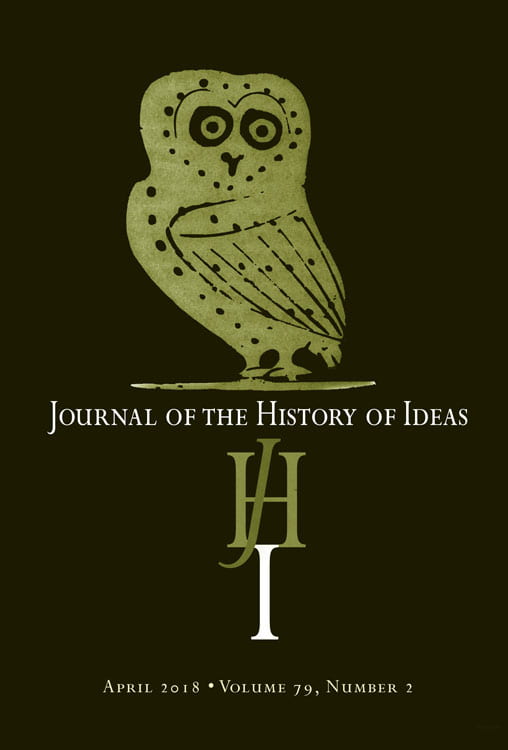The new issue of the Journal of the History of Ideas is now available from Project Muse.
[mc4wp_form id=”12317″]
Historical Approaches to Epistemic Authority: The Case of Neoplatonism
Saskia Aers
“Authority” is a term widely used by scholars from various fields of studies, including the history of philosophy, but its actual meaning often remains obscure. This paper aims to show how a philosophical reflection on the structure of epistemic authority can shed light on this phenomenon and facilitate a better understanding of its meaning in historical research. It will present an analytical model that serves as a tool to get a better grasp on authority relations in historical texts. The benefit of the described model will be demonstrated by a case study on the question of authority in Neoplatonism.
Practices of Intellectual Labor in the Republic of Letters: Leibniz and Edward Bernard on Language and European Origins
Michael C. Carhart
For a project on the origins and migrations of the European nations, Leibniz wanted to see a comparative lexicon purporting to derive the Germanic languages from Asiatic sources. Friends in nearby Gotha were known to have the book; its author had corresponded with Leibniz a few years earlier. But actually getting the book was more difficult than one might expect. In addition to the actual logistics and manners of scholarly communication in the late seventeenth century, this essay shows what scholars were trying to accomplish by establishing the prehistoric origins of the modern nations.
To subject politics to “theory,” “metaphysics,” or “speculation” was disreputable in 1790s Britain, owing largely to the success of Edmund Burke’s Reflections on the Revolution in France (1790), which linked these practices with enthusiasm. This fact is well established, but less studied are the means by which those committed to these forms of inquiry defended their intellectual conduct. Dugald Stewart’s Elements of the Philosophy of the Human Mind (1792) was a pedagogical text that instructed the Scottish elite on how to govern their faculties; it was also a riposte to Burkean prudence, portraying the veneration of practice as theoretically naive.
Transcendental Materialism in the German Free Religious Movement: Science, Nature, and Theology in Kirchliche Reform, 1846-52
Peter J. Ramberg
This essay describes the naturalistic pantheism of the Free Religious movement as it appeared in the journal Reform, published in Halle between 1846 and 1852. The Free Religious advocated a “transcendental materialism,” in which the universe ran not by a deterministic clockwork mechanism, but organically in the same way a tree grows according to particular natural laws. Influenced by Ludwig Feuerbach, David Strauß, and Alexander von Humboldt, the Free Religious went beyond a simple materialism to create a utopian vision of a divine humanity in which Nature itself was divine, both immanent and transcendent, and an object worthy of devotion.
Localizing Dewey’s Notions of Democracy and Education: A Journey across Configurations in Latin America
Rosa Bruno-Jofré
This paper explores the reception of Dewey’s ideas on democracy and education in Latin America from the beginning of the twentieth century through the “long 1960s” (1958–1974). The analysis is framed by a dynamic interplay between the local, regional, and supranational. To bring empirical specificity to Dewey’s “translations,” the author discusses Dewey’s uptake in two political settings, in 1920s Chile and post-revolutionary Mexico, and two cases of Christian adaptation of Dewey’s theories. The long 1960s signaled an epistemic shift in conceptions of education and social transformation. Dewey was not embraced while Paulo Freire and Ivan Illich became the referents.
Sovereignty after Gender Trouble: Language, Reproduction, and Supranationalism in Estonia, 1980–2017
Aro Velmet
This article argues that the recent rise of “anti-gender ideology,” reproductive nationalism, and related discourses is best seen as an attempt to rework the boundaries of national sovereignty in a time of crisis. By focusing on the case of Estonia, the article shows how discourses which linked demographic decline to supranational, totalitarian, and utopian “experimentation” was articulated during the days of perestroika in 1980s Estonia, and how these ideas were later transposed onto the European Union, as a subsequent threat to national sovereignty.
Pierre Bayle’s Correspondence and Its Significance for the History of Ideas
Jonathan Israel
The complete scholarly edition of Bayle’s correspondence adds many new and intriguing details to our knowledge of his career, associates, and preoccupations. However, Bayle was always guarded and cautious about his innermost thoughts and purposes; many of his core concerns and commitments remain veiled from our view. Thus the continuing basic disagreement in recent scholarly literature about him—was he ultimately a committed Protestant, Pyrronist skeptic, atheist, or “Spinozist”‘?—is unlikely to be resolved any time soon. Even so, there are grounds for arguing that the scholarly edition provides evidence that does enable us to considerably narrow that disagreement.




Leave a Reply